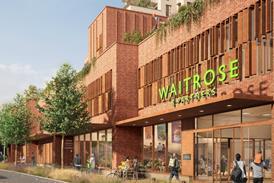Architects criticise chancellor for sidelining the climate crisis
Architects have given a mixed reaction to the budget, with many regretting the chancellor’s failure to place the environment at the centre of Britain’s recovery from the pandemic.
Leading the profession’s response, RIBA president Alan Jones said: “While the chancellor’s focus is understandably on mitigating the impact of the pandemic, the measures announced in the budget do little to reassure me of the government’s commitment to reach net zero or drive a green economic recovery.”

Some of the measures – such as the UK infrastructure bank and green gilts – could help the economy grow back more sustainably, he conceded, but added that it would depend entirely on future investment decisions.
He said the money pledged by Rishi Sunak must be used to create green jobs and fund energy-efficiency programmes such as a national retrofit strategy.
“Taken alongside the personal allowance freeze, the corporation tax rise will have a significant impact on RIBA members and hints at wider tax changes to come,” Jones added.
“It’s therefore vital that the government looks at how the tax system could also help tackle the climate emergency. By reviewing reforming mechanisms to incentivise sustainability the government could successfully drive the green economic recovery that is desperately needed.”
Brendan Kilpatrick, senior partner at housing specialist PRP, writing in Building Design today, said he would have liked to have seen funding to stimulate the creation of businesses that will help the UK reach its carbon targets.
Glenn Howells, founding partner of Birmingham-based Glenn Howells Architects, called for a carbon tax on fossil fuels that could be invested in carbon-free technology.

Julie Hirigoyen, chief executive of the UK Green Building Council (UKGBC), said despite the chancellor’s stated support for green growth, the government’s plans looked more like “build back business as usual”.
“We are still none the wiser about the fate of the Green Homes Grant scheme, which just a few short months ago the chancellor told us would support over 100,000 jobs in green construction up and down the country,” she said, calling for the £1.4bn of unspent funding be rolled over into next year.
The budget largely ignored the huge part greening our buildings could play in delivering a post-covid economic recovery,” she added.
The point was taken up by Ben Derbyshire, former RIBA president and chair of housing practice HTA Design, who said: “Our leaky housing stock is the worst performing in Europe and accounts for 19% of UK carbon emissions. It’s disappointing, in the year we host COP 26, that we have not seized this moment to launch the mass renovation programme that we need to have any chance of achieving net zero by 2050.
“Instead of focusing on the much-needed supply of good-quality, affordable housing, we are seeing the refuelling of demand-side subsidies that increase private debt, drive prices upwards and promote poor-quality speculative housebuilding.”
The “real money” was going to the UK infrastructure bank, he said and urged the government to redefine housing as infrastructure.
Steven Charlton, managing director of Perkins & Will London, saw more to welcome, praising the government for “thinking at all angles to help create funding for green jobs and technology that is necessary for the UK to reach its net-zero targets”.
He added: “The government should recognise that innovative design can play a fundamental role in significantly reducing a building’s environmental footprint and creating places that are truly energy efficient from cradle to grave.”
Meanwhile Dan Hajjar, managing principal at HOK London, said: “The elephant in the room is Brexit and the continuing uncertainty about how professional services firms based in the UK can operate in Europe, including architecture and design practices. The chancellor has missed an opportunity to provide some much-needed guidance on how those affected should be preparing for this transition.”

Dominick Veasey, a director with Nexus Planning, agreed, adding: “It was disappointing that some of the potential post-Brexit construction sector issues and challenges were not covered more fully – such as availability of EU labourers and ensuring the timely flow of construction products and materials.
“For the construction sector to fully contribute to helping the economy recover and grow, it will be essential for the government to ensure the sector has a ready labour force supply and the construction materials it needs.”
Joe Haire, director at White Red Architects, welcomed the “help to grow” scheme designed to help small and medium-size businesses drive the recovery though innovation.
“The harsh lessons from lockdown have made innovation in the construction sector more vital than ever,” he said. “This is an opportunity to take a fresh look at how we use our cities, provide space to live and work and make positive changes for our health and for the environment.”
Peter Hogg, UK cities director at consultant Arcadis, welcomed restart grants for businesses including architects, adding: “While the raise in corporation tax is a significant reversal on 10 years of Tory policy, many will be pleased to see recognition of small businesses with their reduced corporation tax of 19%. The super-deduction for businesses that are investing is also a smart move, incentivising innovation and commitment to growth.”
Olivia Paine, project lead at HLM Architects, said the restart grants and the recovery loans scheme would also help retail, leisure and hospitality businesses. “Throughout lockdown, we have come to appreciate and depend on our local high streets more, underscoring just how critical they are to the vitality of our communities,” she said.

Yasmin Al-Ani Spence, a director at Wilkinson Eyre, said: “Both the infrastructure fund and town centre fund reflect universal public concern about the vulnerability of our public services, town centres and the civic realm.
“This view is not confined to the UK. Public opinion will demand a new approach to currently moribund town centres once we are all allowed out and about again; the restart grant acknowledges this, as does the dedicated pot available for pub regeneration.”
Nexus associate director James Singer, a High Streets Task Force Expert, said: “The announcement of the extension of the Towns Fund to a further 45 town centres is notable, unlocking key public sector interventions and investment across the UK and attracting accompanying private sector investment. The scale of projects varies across the towns, but the most ambitious plans can help to address fundamental spatial issues in the makeup of centres that pre-date the recent lockdowns.”
Victoria Hills, chief executive of the RTPI, warned that plans to revive high streets with the re-opening of shops would fail unless the latest proposals to extend permitted development rights were reversed.
Instead of giving developers “carte-blanche to turn our high street shops and services to residential without going through the democratic planning process that supports a mixed-use approach to placemaking”, housing supply could have been increased through government loans guaranteed for developers to build on currently uneconomically viable sites, she said. “We believe that the chancellor has missed a trick.”
Jack Hosea, director of architects Threefold, said: “It’s a budget that gives more than I expected (though not necessarily to the most vulnerable) but also takes more than I hoped. With the combined headwinds of the pandemic and Brexit still blowing strongly it is vital that taxes won’t be raised immediately.”
There was no escaping the fact that we will have to pay back the largest deficit since the Second World War, but was hopeful that the two-year buffer on the corporation tax rise would give businesses the headroom they need to forge a strong economic recovery. “The construction industry has always been vital in this,” he said.
”Tax on company profits seems a fair place to look to raise money but I hope that support for the least well-off in society is maintained beyond the pandemic or preferably increased in tandem,” he added.
















No comments yet